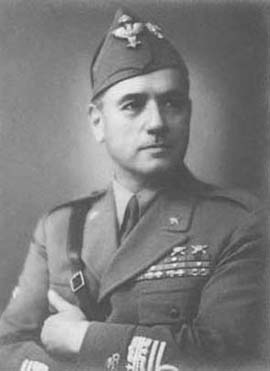Giovanni Messe

Giovanni Messe (December 10, 1883 - December 19, 1968) was an Italian soldier, politician and quite possibly the most distinguished Italian Field Marshal (Maresciallo d'Italia).
Early life and career
Born on December 10, 1883 near the city of Brindisi, Giovanni Messe pursued a military career in 1901. He saw action in the Italian conquest of Libya and in the First World War. During this conflict, he gave an important contribution to the creation and training of the "Arditi" (the Courageous), special infantry units. Emerging considerably decorated from these conflicts, he became aide-de-camp to King Victor Emmanuel III, holding this post from 1923 to 1927. From this date until 1935, Messe commanded a unit of Bersaglieri and held the rank of Colonel.
In September 1935, Messe assumed command of a motorised brigade in Verona, with the rank of Brigadier General. Following a succecssful period of service with this unit in the Second Italo-Abyssinian War, Messe was promoted to rank of Major General and he became commander of an Italian armoured division.
The Second World War
On April 1939, following the annexation of Albania, he was appointed to serve under Albania's governor, General Ubaldo Soddu. Messe commanded a corps during the Greco-Italian War of 1940-41 and achieved some success against Greek forces commanded by Alexandros Papagos. Before winter had even set in however, the Italian forces were forced onto the defensive, as Greek forces launched a counterattack and moved into parts of Italian controlled Albania. In April 1941, with the help of the German Wehrmacht, the campaign ended in an Axis victory.
Messe's experience with armoured warfare might, in other circumstances, have seen him commanding Italian forces alongside Rommel in North Africa, but instead he was chosen to be the commander of CSIR, the Italian expeditionary force that took part in Operation Barbarossa, the German invasion of the Soviet Union. At the start of Operation Barbarossa, the number of Italian troops in the Eastern theatre numbered around 60,000. By July 1942 the number had grown to 200,000. Although the troops fought well, after the German defeat at Stalingrad the campaign in the Soviet Union turned against the Axis powers. Italian forces had been severely mauled during Operation Uranus (the successful Soviet attempt to encircle the German Sixth Army, entrenched at Stalingrad) while trying hold back the Soviet forces.
At the end of January 1943, he was appointed as the new commander of Rommel’s Panzer Army Africa, which was now re-named 1st Italo-German Panzer Army (in recognition of the fact that it consisted of one German and three Italian corps). Though Messe was to replace Rommel, he diplomatically deferred to the German, and the two co-existed in what was theoretically the same command until mid-March, when Rommel finally departed Africa for good. Under the supposed command of Field Marshal Erwin Rommel, Messe fought a defensive campaign against the advancing American and British forces. Rommel had already left Africa because of health reasons, but his departure was kept secret by the express order of Hitler, both in order to maintain the morale of the Axis troops and to continue to inspire fear and caution in their enemies. While in sole command of all Axis forces in Tunisia (the 1st Italian Army, the DAK and 5th German Army), General Messe's able defensive victory achieved at Mareth and the continuous tactical delaying of the Allied offensive could not prevent the inevitable defeat of the Axis in North Africa. On May 13 1943, after the collapse of the 5th German Army, the fall of Tunis and the surrounding of the 1st Italian Army, still holding the line at Enfidaville, he formally surrendered the remnants of Army Group Afrika to the Allies. On May 12th, one day before the surrender, Messe was promoted to the rank of Field Marshal (Maresciallo d'Italia).
As a loyal supporter of the Royalist cause, like many Italian officers Messe soon found himself re-employed, when after the Italian capitulation in September 1943, he was made Chief of Staff of the Royal Italian Army, consisting of those units loyal to King Victor Emmanuel, many of which were reconstituted from Italian POWs and armed by the Allies. He served in this post with distinction until the war's end and then retired from the military in 1945 after 44 years of distinguished service.
Life after the army
His later life was not uneventful. Following the conclusion of the war, he wrote a book about of his experiences, entitled Come finì la guerra in Africa. La "Prima Armata" italiana in Tunisia. His military popularity remained with him in civilian life and from 1953 to 1955, Messe was a democratically elected representative in the Italian Senate. He was also President of the Italian Veterans Association, a post which he held until his death.
Giovanni Messe died on December 19, 1968, at the age of eighty-five. A competent and humane commander, he was popular with those who served under him and was respected by those who fought against him.[citation needed]
